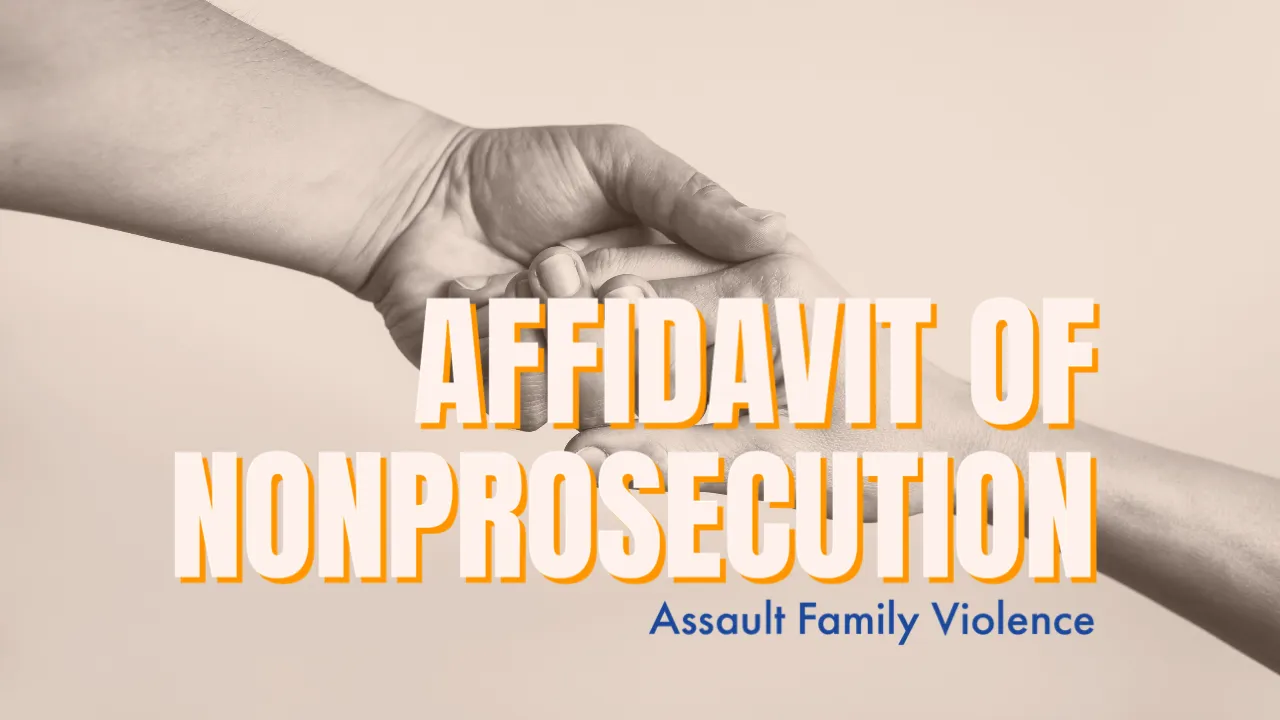Key Takeaways
- An affidavit is a sworn statement made under penalty of perjury.
- Affidavits of non-prosecution (“ANP”) indicate that the witness does not want to see the defendant prosecuted for the crime of which they are accused.
- These sworn statements are inadmissible at trial and do not replace live testimony.
- However, attorneys may impeach a witness if the witness’s testimony contradicts their ANP.
- ANPs are not magic bullets. Well-written affidavits help the defense, but prosecutors do not have to dismiss a case simply because the victim/complainant wrote an ANP.

Affidavits of Non-Prosecution, also known as ANPs, provide victim/complainants the opportunity to tell prosecutors, in the form of a sworn witness statement, that they do not wish to see the defendant prosecuted. ANPs usually contain a statement in which the victim/complainant indicates that he or she will not cooperate with the prosecuting attorneys’ efforts to prosecute the case against the defendant. In addition, ANPs provide the victim/complainant an opportunity to tell their side of the story and correct any incorrect account described in the police officers’ offense reports.
How Do You Write an Affidavit of Non-Prosecution?
If you are the victim/complainant in an assault family violence case in Texas, the ANP is your statement. No one else should write it for you. No one should pressure you to write the statement against your will. And no one should looking over your shoulder as you write your statement.
Tips for Writing an Effective ANP
At My Dallas Criminal Lawyer, we prefer that victim/complainants write their affidavits of non-prosecution by hand. Typed ANPs leave the door open for prosecutors to assume that someone else, such as the defendant or the defendant’s attorney, wrote the statement and coerced the victim/complainant to sign off on the statement as their own.
While there is no set length required to write an effective ANP, we provide a few basic guidelines:
- Short ANPs that contain no facts about the case and merely indicate that the author does not want to see prosecutors prosecute the case do little to help. These minimalistic statements give the impression that someone is forcing the victim/complainant to write the statement. In my experience, brief ANPs do little to convince prosecutors to dismiss a case.
- ANPs that are several pages long often contain irrelevant facts. Busy prosecutors may not absorb this lengthy content and may miss the important details that we want to draw their focus.
- An ideal affidavit of non-prosecution will contain enough information to provide context about the relationship between the defendant and the victim/complainant at the time of the incident, it will correct any errors officers have written in their reports, it will address an element that prosecutors have to prove, and it will state a reason why the author believes further prosecuting the defendant will not serve justice.
Addressing Elements of the Offense in the Affidavit of Non-Prosecution
Prosecutors and criminal defense attorneys break Texas criminal statutes down into elements. Prosecutors must prove each element of an offense beyond a reasonable doubt to secure a conviction at trial. If we can convince prosecutors that they may not be able to eliminate reasonable doubt from one of these statutory elements, we have a good chance to secure a dismissal.
In assault family violence cases, prosecutors must prove the elements described in Texas Penal Code Section 22.01. The elements in Class A misdemeanor assault family violence, for example, are:
- Defendant’s identity
- Date of offense
- County in which the alleged assault occurred
- Mental state (intentionally, knowingly, or recklessly)
- Caused bodily injury (pain)
- To another person (victim/complainant)
- By a certain manner and means
- And the relationship meets the requirements described in Ch. 71 of the Texas Family Code
With Class A misdemeanor assault family violence cases, the bodily injury element provides fertile ground for attack. While cases exist with clearly visible injuries, many Class A misdemeanor cases lack clear, objective bodily injury. Prosecutors need the victim/complainant to credibly testify that they felt pain as a result of physical contact caused by the defendant. A sworn statement that indicates the victim/complainant did not feel pain, for example, carries significant weight.
What Happens After I Write an Affidavit of Non-Prosecution?
Prosecutors will review the ANP and follow up with the victim/complainant to confirm what the ANP says. A well-written ANP can create significant challenges for prosecutors to overcome. They will want to confirm that no one forced the victim/complaint to write the ANP, that the ANP contains the victim/complainant’s true recollections and wishes, and that no additional assaultive incidents have taken place either before the defendant’s arrest or after.
Does an ANP Guarantee a Dismissal?
No. Just because we submit an affidavit of non-prosecution does not mean prosecutors automatically dismiss a case. For one, prosecutors may not believe the statements that the ANP contains. If prosecutors have evidence of visible injuries or medical records that can prove bodily injury in spite of an uncooperative victim/complainant, they may proceed with prosecuting the case. When the defendant has a history of family violence, prosecutors may be willing to lose a weak case at trial before they agree to a dismissal.
What if the Affiant Changes Their Mind?
We frequently see victim/complainants change their minds, sometimes on multiple occasions, while an assault family violence case works its way through the criminal justice system. When the victim/complainant writes an ANP and then decides he or she wants to support the prosecution, prosecutors may become unwilling to dismiss the assault family violence case. In these instances, we use the ANP as an impeachment tool at trial.
The Strategic Value of an ANP
We understand that pending assault family violence accusations can create a stressful, volatile environment for the parties living with them. We provide helpful affidavits of non-prosecution to the prosecutor assigned to the case. If the victim/complainant changes their mind after writing their ANP, we have a frank discussion with the prosecutor about what will happen if the case goes to trial.
For example, in the Class A misdemeanor assault family violence context, if we have a well-written ANP that credibly denies bodily injury and prosecutors do not have objective evidence to prove the bodily injury element, we will use the affidavit to impeach the victim/complainant during cross-examination.
Assuming the victim/complainant would testify that he or she felt pain during a trial, we would then cross-examine the victim/complainant by confronting him or her with their prior sworn ANP. We point out to the jury that the witness indicated no bodily injury occurred under oath in their affidavit. Now the witness testifies, under oath, that bodily injury did occur. We argue that it is impossible that both forms of sworn testimony can be true.
The affidavit of non-prosecution serves to discredit the victim/complainant’s testimony at trial when the victim/complainant flip-flops while the case is pending. Prosecutors know that such cross-examination at trial will damage their star witness’s credibility with the judge or jury. Prosecutors will inform victim/complainants about what may happen at trial when this impeachment occurs. And often we secure a favorable outcome for our clients even when the victim/complainant changes their stance on prosecution.
Charged with Assault Family Violence?
Let our skilled Dallas domestic violence defense attorneys fight for you. Contact us today to schedule a consultation.


